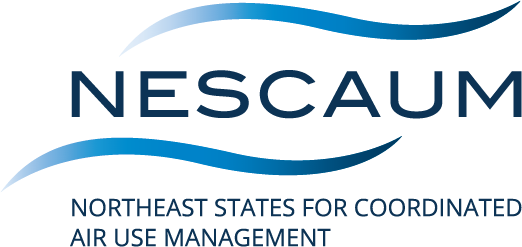NESCAUM Welcomes EPA Action Issuing Clean Air Act Waivers for State Clean Truck Standards
For Immediate Release:
March 31, 2023
Contact:
Paul J. Miller
NESCAUM Executive Director
(617) 259-2016
pmiller@nescaum.org
Boston, MA—Today, the U.S. Environmental Protection Agency (EPA) granted California’s requests for waivers of preemption under the Clean Air Act (CAA) for several of the state’s clean truck standards, including its Advanced Clean Trucks (ACT) regulation. The Northeast States for Coordinated Air Use Management (NESCAUM) welcomes EPA’s action, which reaffirms states’ long-standing authority under the CAA to regulate emissions from cars and trucks.
“Transportation is the largest source of greenhouse gas emissions in the nation and a major source of air pollutants that harm public health,” said Paul Miller, NESCAUM’s Executive Director. “Exposure to exhaust from diesel trucks can worsen asthma, trigger heart attacks and strokes, and lead to cognitive challenges, and contributes to thousands of premature deaths each year. The ACT regulation, which requires manufacturers to transition from diesel trucks to zero-emission trucks, will help to address the increased public health risk for communities located near heavy truck traffic.”
Under the CAA, California has broad authority to adopt and enforce emissions standards for new motor vehicles that are more stringent than federal standards, as long as EPA waives preemption, and other states may adopt and enforce standards identical to California’s standards. To date, six states—California, Massachusetts, New Jersey, New York, Oregon, Vermont, and Washington—have used this authority to adopt the ACT regulation, which requires increasing percentages of sales of new trucks, vans, and school buses to be zero-emission vehicles (ZEVs). Many more states are expected to follow.
“History shows that ZEV sales requirements provide the regulatory certainty needed to drive public and private investment in zero-emission technology,” Miller said. “Adoption of California’s ZEV standards by other states creates a national market that enables truck and bus manufacturers, suppliers, and charging providers to achieve economies of scale, lowers consumer costs, and creates jobs in manufacturing, infrastructure, and supporting industries. These states also serve as a proving ground for advanced vehicle technologies and provide the foundation for strong federal standards,” Miller said.
In addition to ACT regulation, EPA also waived preemption for California’s Heavy-Duty Vehicle and Engine Emissions Warranty and Maintenance regulations, its Zero-Emission Airport Shuttle regulations, and its Zero-Emission Power Train Certification regulations. EPA has yet to waive preemption for California’s Heavy-Duty Omnibus Low NOx regulation, which sets nitrogen oxides and particulate matter emissions standards for new on-road diesel- and gas-powered trucks and buses.
* * *
NESCAUM is the non-profit association of state air quality agencies in the six New England states, New Jersey, and New York. NESCAUM serves as a technical and policy advisor to its members and works with broader groups of states to develop policy approaches to achieve their shared air quality and climate goals. For more than three decades, NESCAUM has collaborated closely with states, federal agencies, industry, and stakeholders to reduce transportation emissions. NESCAUM also facilitates the Multi-State ZEV Task Force, which includes representatives from 17 states, D.C., and Quebec working together to accelerate adoption of zero-emission trucks and buses by implementing the Multi-State Medium- and Heavy-Duty ZEV Action Plan. By working to identify market barriers, develop policy solutions, and elevate mutual ambitions, NESCAUM helps states amplify their impacts on the national ZEV market.
###
